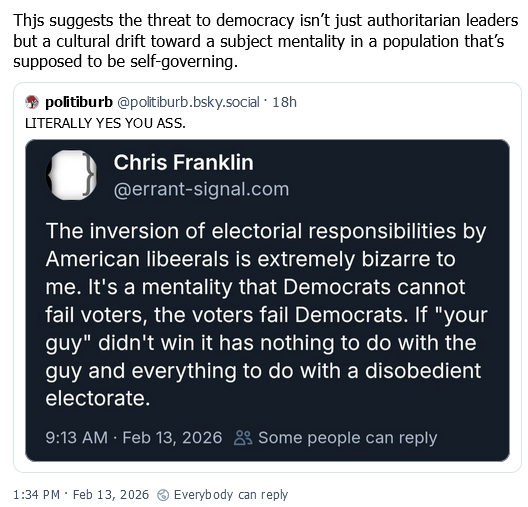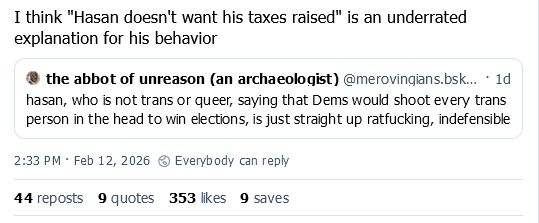lol the state of the union is going to be a fucking tire fire this year
— GOLIKEHELLMACHINE (@golikehellmachine.com) February 13, 2026 at 6:48 PM
To repeat myself: The Repubs don’t want a State of the Union speech this year, because a prime-time Airing of His Senile Majesty’s Many Grievances is liable to perturb even their beloved low-info voters. I personally suspect that some of the GOP defections on the shutdown vote were aimed at keeping Trump off the air on February 24th. Debate me!
The Cabinet this week
*RFK Jr. bragged about snorting cocaine off of a toilet seat
*Lutnick acknowledged taking his family to Epstein island
*Bondi “The Dow” / refuses to look at victims
*Noem blanket
*Hegseth loses to Kelly, tries to tweet through it
*Bessent “tariffs don’t cause inflation”— Steven T. Dennis (@steventdennis.bsky.social) February 13, 2026 at 8:55 PM
Thank Murphy the Trickster God for Democrats who know who the enemy is.
Republicans are about to shut down FEMA, the Coast Guard and TSA in a few hours.
Instead of getting ICE under control this guy is having another meltdown online.
We will never let you steal the midterm election.— Hakeem Jeffries (@hakeem-jeffries.bsky.social) February 13, 2026 at 8:08 PM
Kristi Noem must resign or be fired immediately.
— Rep. Lauren Underwood (@underwood.house.gov) February 13, 2026 at 2:00 PM
The economy couldn’t be better for the wealthy & well-connected—and Epstein-class billionaire donors are making more than ever.
But most of us are struggling to pay for groceries, rent, and healthcare. Thanks to this rigged economy, we’re getting screwed.— Rep. Jim McGovern (@repmcgovern.bsky.social) February 13, 2026 at 12:23 PM
Your eyes don’t lie. We’ve all seen the horrific videos of ICE in Minnesota. No matter what Republican lawmakers try to tell us or who they try to blame, Americans know the truth about what’s happening here. And it can’t be allowed to happen here — or anywhere else — ever again.
— Amy Klobuchar (@amyklobuchar.com) February 12, 2026 at 7:57 PM
I think strategically there’s nothing Dems could do more powerful than banning masks. If ICE/CBP have to show their faces they will lose current agents & their recruitment will collapse.
— Dana Houle (@danahoule.bsky.social) February 13, 2026 at 10:23 PM







